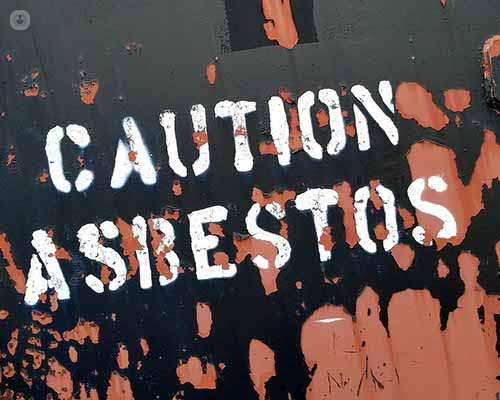Mesothelioma
Dr Omar Khan - Medical oncology
Created on: 05-25-2017
Updated on: 10-04-2023
Edited by: Karolyn Judge
What is mesothelioma?
Mesothelioma is a fairly rare type of cancer that can develop in the lining of certain organs and it is usually linked to exposure to asbestos.
Mesothelioma affects either the lining of the lungs, known as pleural mesothelioma, or the stomach lining (peritoneal mesothelioma), and even the lining of the heart or testicles sometimes. Typically, mesothelioma is most often diagnosed in people aged between 60 and 80, and it's more common in men.

What's the outlook for mesothelioma?
Unfortunately, there is no cure for mesothelioma, however, treatment can help to manage the symptoms and improve quality of life. The general outlook for this type of cancer is quite poor because symptoms do not appear for a while (years in many cases), and hence it is usually diagnosed at a later stage. Recent statistics in the UK show that there are approximately 2500 deaths per year from mesothelioma. However, it's expected for this figure to decrease in the future due to the 1999 ban of asbestos.
What are the symptoms of mesothelioma?
Symptoms appear gradually, and if exposure to asbestos is relevant, symptoms will develop years or even decades after exposure.
If mesothelioma affects the lungs (pleural mesothelioma), then symptoms may include:
- Shortness of breath
- Persistent cough
- Chest pain
- Tiredness
- Unexplained weight loss
- Fever and sweating, often at night
- Swollen fingertips
If you have peritoneal mesothelioma (affecting the stomach lining), symptoms may include:
- Stomach pain
- Swelling or bloating of the stomach
- Loss of appetite
- Unexplained weight loss
- Constipation or diarrhoea
How is mesothelioma diagnosed?
If mesothelioma is suspected, then you will likely be referred by your GP to a specialist. The specialist may carry out the following diagnostic tests to confirm the diagnosis and to assess how far it has spread throughout the body.
- CT scan
- X-ray of chest or stomach
- Laparoscopic examination of the chest or stomach (done under sedation or anaesthetic), sometimes a biopsy will be taken
- Fluid drainage from the lungs or stomach using a needle. This fluid can be tested and analysed.
What are the causes of mesothelioma?
Generally, mesothelioma is nearly always associated with exposure to asbestos. Asbestos was previously used a lot in construction and insulation. However, its use has been banned since 1999. Asbestos is made up of tiny fibres, which can easily enter the lungs, causing damage over time. Symptoms may not appear for up to 20 years later.
Can mesothelioma be prevented?
Mesothelioma can be avoided by avoiding exposure to asbestos.
How is mesothelioma treated?
Treatment can depend on how far along the cancer is and the status of your overall health. Due to the fact that mesothelioma is nearly always diagnosed at a later stage (because symptoms do not show for a long time), treatment will often aim to control symptoms and prolong life (i.e. treatment is usually palliative care).
Other treatments for mesothelioma may include:
- Radiotherapy
- Chemotherapy
- Surgery
- Pleural effusion (to remove built-up fluid in the chest)
Which type of specialist treats mesothelioma?
Depending on your treatment, mesothelioma may be treated by a surgeon, medical or clinical oncologist, or a specialist in palliative care.












